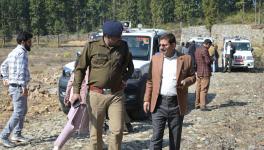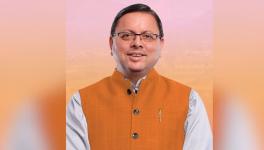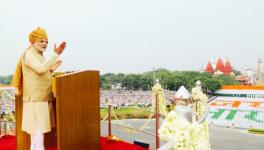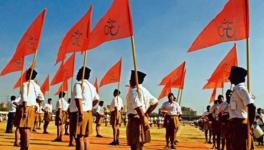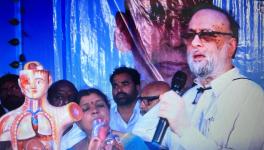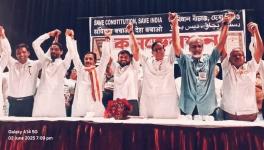The Many Silences of Mohan Bhagwat
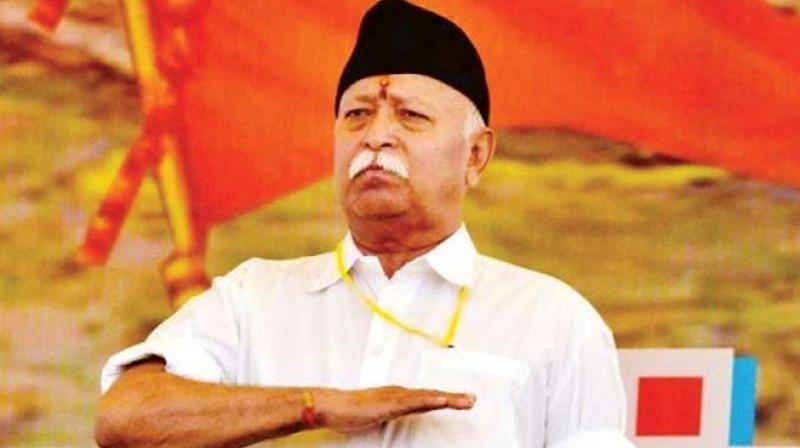
Image Courtesy: Deccan Chronicle
What is the present situation in Titoli, a village less than a hundred kilometres from the national capital?
Whether the ban on public namaaz imposed by the village panchayat has been lifted? What about its diktat that Muslim residents (around 800) cannot keep beards, and have to choose only Hindu names for their children and its takeover of a Waqf property being used as a graveyard by the Muslims and substituting it by providing a piece of land to them far away from the village?
The news -- which once again demonstrated growing normalisation of a majoritarian project which is underway since the last four and half years -- made headlines just when Rashtriya Swayamsevak Sangh (RSS) Supremo Mohan Bhagwat was sermonising on 'Bhavishya ka Bharat'.
Everybody knows how the three-day lecture series on 'Future of India' was beamed live on many TV channels and there was a competition of sorts among commentators to sing paeans to 'changed RSS'. Many a liberal were also enamoured about this Hindutva of a different kind where the RSS Supremo appreciated the role of Congress in the Independence struggle or even quoted Sir Syed Ahmad's speech when he was supposedly felicitated by the Arya Samaj. Perhaps for them it was reassuring that the Constitution received praise in his speech as well or in the same breath, he emphasised that “Hindu Rashtra does not mean it has no place for Muslims".
Questions That Beg an Answer
Looking back, it is doubly clear that the select group of invitees -- which included quite a few celebrities -- was there mainly to add glamour/legitimacy to Hindutva's worldview and tell the outside world about this new look RSS and, as expected, none of them posed any uncomfortable question before the Sangh Patriarch.
A simple question that could have been raised is how the whole idea of Hindu Rashtra, which is premised on the superiority of a particular faith, is compatible with the Constitution, which guarantees equality of rights as well as opportunities to everyone irrespective of her/his faith, sex, caste, region, race. Perhaps, a subsidiary question could have been: what place '..[d]oes Muslims and other minorities have in the Hindu Rashtra'.
Would it be similar to the position of religious minorities under a Nizam-e-Mustafa or a Islamic Nation or it would be different? Whether the minorities would continue to live 'at the benevolence of majority Hindus' -- as claimed by Bhagwat's predecessors -- in a formal hierarchical relationship, basically as secondary citizens or they would have equal claims on the nation. Whether they would be still be declared 'internal enemies' as formulated by the second RSS supremo Golwalkar in his well-known monograph 'Bunch of Thoughts.'
Of course, you cannot expect that anyone from the select gathering would have put a question about Titoli village itself, asking whether under his newly-minted variety of Hindutva, would Titoli be an exception or the rule?
But was it really necessary that somebody should have got up and asked Bhagwat about this village of hapless Muslims -- about whom the district administration was also formally unaware, despite it making headlines in major newspapers. A layperson could also think that if Mr Bhagwat was really sincere about differentiating his vision of Hindutva from its earlier practitioners, the developments in Titoli were a unique opportunity to demonstrate that his attempt is not merely to present a sanitised version of Hindutva, not meant to add a new packaging to its inner core based on hate and exclusion, and he was really trying to break free from its earlier asymmetries.
All reports -- even the live telecast -- show that neither did Bhagwat speak about the position of religious minorities in his vision of things nor did he utter a single word on Titoli. He let his silence do the speaking.
He knew perfectly well that if Titoli gets mentioned, then questions about Atali and many such villages, localities would be raised. And then all his well-crafted attempt to put RSS and its worldview in a new language would come a cropper.
But was Bhagwat’s silence over Titoli or the place of minorities in the Hindutva worldview the only silence in his three-day lecture series?
“We respect the Indian Constitution. A lot of thought has gone into making it. It was done through consensus. The Sangh has never gone against the Constitution.”
Interestingly, Bhagwat talked positively about the Indian Constitution, appreciated that a lot of thought and effort has gone into making it and how the whole work was 'done through consensus' and even underlined that his organisation now respects it.
All of this sounded really well.
Track Record on Constitution
The RSS Supremo’s claim of respect for the Constitution suddenly reminded one of a Hindi proverb which says 'Der aaye, durust aaye' ( Better late than never) One felt that at least now in its 93rd year of its formation, the RSS has finally accepted the supremacy of the Constitution and intends coming to terms with it because its own track record says otherwise.
In fact, history bears witness to the fact that when leaders of newly independent India were struggling to have a Constitution which was premised on the inviolability of individual rights with special provisions of positive discrimination for millions of Indians who had been denied any human rights quoting religious scriptures, the then spokesperson of the organisation -- then under the supremoship of Golwalkar -- espoused Manusmriti as independent India’s constitution. Organiser ( November 30, 1949, p.3) the organ of RSS, had even complained:
But in our constitution there is no mention of the unique constitutional developments in ancient Bharat. Manu’s laws were written long before Lycurgus of Sparta or Solon of Persia. To this day laws as enunciated in the Manusmriti excite the admiration of the world and elicit spontaneous obedience and conformity. But to our constitutional pundits that means nothing.
When attempts were made under the stewardship of Ambedkar and Nehru in the late forties to give limited rights to Hindu women in property and inheritance through the passage of the Hindu Code Bill , Golwalkar and his associates had no qualms in launching a movement opposing this historic empowerment of Hindu women which was to take place for the first time in history. Their contention was simple: This step is inimical to Hindu traditions and culture.
And despite the fact that opposition to making of the Constitution badly floundered then, efforts continued in that direction. Talk of reviewing the constitution continued unabated. And when the first government led by Atal Bihari Vajpayee was installed in Delhi (1996), one of the first tasks undertaken by it was to appoint a commission to review the Constitution.
A clarification of sorts was definitely needed on Bhagwat's part explaining when did the RSS start 'respecting the Constitution' because merely few months back, he himself had “[p]itched for changes in the Constitution and jurisprudence in line with the value systems of the country” while addressing the Akhil Bharatiya Adhivakta (Advocates) Parishad in Hyderabad and how under his own eyes BJP - which is one of the affiliated organisations of the RSS - has brought in citizenship Bill which aims at turning India into a “a natural home for persecuted Hindus” which essentially in the garb of humanitarianism is trying "to upturn the Constitution of India by slyly trying to introduce religious right-to-return."
No doubt his claim that 'Sangh has never gone against the Constitution' should be taken with a pinch of salt.
RSS and Women
Interestingly, Bhagwat in his speech was quite emphatic about RSS being a 'democratic organisation' which supposedly does not wield the “remote control” over any of its offshoots, nor does it aspire for “domination”.
Well, on closer scrutiny one can say that the intentions to portray oneself as 'democratic' could be noble but they are at variance with the reality.
The foremost thing is that RSS is still not ready to accept around half of population - namely women - as equal members making it basically an organisation of Hindu males.
When someone raised a question about keeping women out, Bhagwat had no qualms in saying that the organisation is just following what their founders have decided as the situation warranted then - which supposedly according to them was not conducive to mixing of men and women - (and thus formed a separate women's wing) and he does not see any qualitative change in the situation. Perhaps, he did not say it in so many words that RSS still believes the formulations of his second Supremo Golwalkar which found expression in his book 'Bunch of Thoughts' that women are predominantly mothers who should rear their children.
The point to ponder is whether claim of any organisation -- as being democratic-- is sustainable which has closed its doors for around half of the population. If the answer is in the affirmative, it would also mean 'Muslim Brotherhood' in Egypt which has formed a separate 'Sisters Division' and has never accommodated a single women in its organisational structure is also a 'democratic' organisation.
Apart from equality of members, being 'democratic' has another connotation which is a system where leaders are chosen by elections.
A cursory glance at the history of the organisation reveals that the RSS leadership has been what one commentator says 'one of India's most exclusive clubs'. Barring one, all its Sarsanghchalak belonged to Brahmin caste. Within the RSS, the tradition has been that the Supreme leader (Sarsanghchalak) is known to appoint his successor even more than 70 years after its formation. Sangh's first Supremo Hedgewar nominated M S Golwalkar to succeed him (1940) and how Golwalkar handed over the reins to Balasaheb Deoras in (1973) who in turn nominated Rajju Bhayya during his own lifetime (1996) and supposedly broke the tradition of succession only after the death of the incumbent. Since around last two decades there is a slight change where the Pratinidhi Sabha now decides - whose membership is not based on election but selection.
Telling Silence Over Golwalkar
Last but not the least what surprised many that Bhagwat maintained near formal silence over Golwalkar, the second supremo of RSS, (1940-1973) who is supposed to be the ''prime architect" of the organisation and is known for the organisation's unique approach of creating affiliate organisations reaching out to different sections of the society.
A correspondent/analyst with a leading English daily even counted how Bhagwat "invoked 32 different personalities as many as 102 times in the first two days of his lectures to show how the Sangh incorporates the best of diverse sources."
Whereas RSS founder .K B Hedgewar got the maximum number of mentions (45)" and Bhagwat even "referred to political figures like Mahatma Gandhi, B R Ambedkar, Motilal Nehru, Jawaharlal Nehru, Rabindranath Tagore, Subhash Chandra Bose, Veer Savarkar, M N Roy, AMU founder Sir Syed Ahmed Khan and even little known Sangh figures along with Buddha, Zarathustra, Ramakrishna Paramhans, Dayanand Saraswati, Vivekananda, Guru Nanak and Shivaji" ( -do-) Golwalkar was not even mentioned on the first two days of the series. He found mention only on the hird day during the question-answer session.
The silence around Golwalkar was telling.
What is worth emphasising that not only for Bhagwat but for the RSS, adopting/upholding Golwalkar has always been a tricky affair. Reason being the near impossibility of presenting repacked version of Golwalkar, which would fit into the mood of the 21st century.
Remember RSS has had six supremos - Hedgewar, Golwalkar, Deoras, Rajendra Singh, K S Sudarshan and now Mohan Bhagwat - till date. Of course none of them proved as controversial as Golwalkar.
A cursory glance at the his life and times tell us that Golwalkar spanned a period in world history, which could be said to be unique in many ways. It was such a juncture in world history when the old world of feudalism, colonialism, was crumbling and a new world was emerging. And it would not be incorrect to state that due to because of peculiar world view which yearned for building a Hindu Rashtra based on the ‘glorious traditions of Hinduism’ and which looked towards Muslims as bigger adversary vis-a-vis British colonialism and which sought inspiration from the experiments in ‘social engineering’ undertaken by Nazism-Fascism, he completely failed to have a pulse on the march of history. In fact, due to his intransigence, he not only kept himself personally aloof from the surging anti-colonial struggle but also did not chalk out any positive programme for his organisation to participate in it.
The first of his theoretical contributions for the cause of Hindutva appeared in the form of a pamphlet called ‘We or Our Nationhood Defined’ (1938). It was so straightforward in its appreciation of the ‘ethnic cleansing’ of Jews undertaken by Hitler and such an unashamed proponent of the submergence of ‘foreign races’ in the Hindu race that later day RSS leaders have tried to create an impression that the said book was not written by Golwalkar but it was merely a translation of a book ‘Rashtra Meemansa’ by Babarao Savarkar.
It is a different matter that in his Preface to We or Our Nationhood Defined dated March 22, 1939, Golwalkar himself described Rashtra Meemansa as ‘one of my chief sources of inspiration and help. The American scholar Jean A. Curran, who did a full length study on RSS in early fifties, in his sympathetic book, Militant Hinduism in Indian Politics: A Study of the RSS (1951) confirms that Golwalkar’s 77-page book was written in 1938 when he was appointed RSS General Secretary by Hedgewar and he calls it as RSS’s ‘Bible’.
Bhagwat's three-day lecture series revealed that RSS also wants to wriggle itself out of Golwalkar's second and equally controversial book 'Bunch of Thoughts' which talks of Muslims, Christians and Communists as Internal Enemies and has also made equally controversial statement regarding constitution as well as affirmative action.
Bhagwat knows that for a new-look RSS, anti-human solutions offered by Golwalkar, would prove costly. It was not for nothing that RSS has brought out a new book which presents an edited - or should one say sanitised - version of Golwalkar's ideas, to make them more palatable to the wider populace.
The explanation offered by Bhagwat to bring out this new edition was least convincing:
As far as Bunch of Thoughts goes, every statement carries a context of time and circumstance…his enduring thoughts are in a popular edition in which we have removed all remarks that have a temporary context and retained those that will endure for ages. You won’t find the (Muslim-is-an-enemy) remark there.
To conclude, Mr Mohan Bhagwat, the strongest Supremo in RSS's history, is at liberty to do anything to package the exclusivist worldview of RSS or any of its leaders, in a more attractive manner but he needs to know that such piecemeal approach - editing ideas of this Supremo, glorifying another Supremo, - is bound to flounder in the long run unless and until he is ready to overhaul the worldview which has been guiding the organisation which is essentially exclusivist and out of tune with times.
And for all those liberals - who are enamoured about this new look RSS - it need be told that, it is not for the first time that RSS is engaged in a makeover.
Way back in 1977, when Janata Party came to power, an impression was even created that the secretive RSS was even ready to admit even Muslims in its ranks. It took a lot of time for the genuinely concerned citizens to comprehend that all that was meant for mere public consumption.
Get the latest reports & analysis with people's perspective on Protests, movements & deep analytical videos, discussions of the current affairs in your Telegram app. Subscribe to NewsClick's Telegram channel & get Real-Time updates on stories, as they get published on our website.










